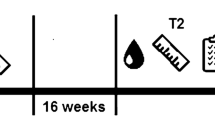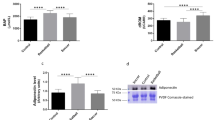Abstract
The aim of this study was to investigate the effects of Ramadan fasting and time-of-day on biochemical responses to an intermittent exercise [Yo–Yo test level 1, (YYIRT)]. Twenty male soccer players (17.52 ± 0.2 years, 177.4 ± 2.9 cm) completed the YYIRT at 0700 and 1700 hours on three occasions: 1 week before Ramadan (BR), the second week of Ramadan (SWRR2), and the fourth week of Ramadan (ERR4). The total distance covered during the YYIRT (TD) was recorded. Moreover, blood samples were obtained before and after the YYIRT for biochemical measurements. TD was higher BR than during Ramadan in the evening (P < 0.05), but not in the morning. However, there was no significant difference between BR and Ramadan in the morning. While post-exercise values of blood lactate (Lac), glucose (GLC), and markers of muscle injury were greater higher in the evening, resting total antioxidant status (TAS) and uric acid (UA) levels were higher in the morning as compared with the evening BR. These diurnal variations were hidden during Ramadan due to a significant decrease in Lac (P < 0.01), GLC (P < 0.05) and cellular damage (P < 0.05) and an increase in TAS and UA (P < 0.05) values in the evening. No significant difference in biochemical responses was observed in the morning during SWRR2 and ERR4 as compared with BR. In summary, the present study indicates that YYIRT performance was affected by Ramadan fasting only in the evening in young soccer players. The modified diurnal pattern of biochemical responses could explain this performance decrement.

Similar content being viewed by others
References
Bouhlel E, Salhi Z, Bouhlel H, Mdella S, Amamou A, Zaouali M, Mercier J, Bigard X, Tabka Z, Zbidi A, Shephard RJ (2006) Effect of Ramadan fasting on fuel oxidation during exercise in trained male rugby players. Diabetes Metab 32:617–624
Chaouachi A, Chamari K, Roky R, Wong P, Mbazaa A, Bartagi Z, Amri M (2008) Lipid profiles of judo athletes during Ramadan. Int J Sports Med 29:282–288
Maughan RJ, Leiper JB, Bartagi Z, Zrifi R, Zerguini Y, Dvorak J (2008) Effect of Ramadan fasting on some biochemical and haematological parameters in Tunisian youth soccer players undertaking their usual training and competition schedule. J Sports Sci 26:S39–S46
Chaouachi A, Coutts AJ, del Wong P, Roky R, Mbazaa A, Amri M, Chamari K (2009) Haematological, inflammatory, and immunological responses in elite judo athletes maintaining high training loads during Ramadan. Appl Physiol Nutr Metab 34:907–915
Chennaoui M, Desgorces F, Drogou C, Boudjemaa B, Tomaszewski A, Depiesse F, Burnat P, Chalabi H, Gomez-Merino D (2009) Effects of Ramadan fasting on physical performance and metabolic, hormonal, and inflammatory parameters in middle-distance runners. Appl Physiol Nutr Metab 34:587–594
Shephard RJ (2012) The impact of Ramadan observance upon athletic performance. Nutrients 4:491–505
Aziz AR, Chia M, Singh R, Wahid MF (2011) Effects of Ramadan fasting on perceived exercise intensity during high-intensity interval training in elite youth soccer players. Int J Sports Sci Coach 6:87–98
Bouhlel E, Denguezli M, Zaouali M, Tabka Z, Shepard RJ (2008) Ramadan fasting’s effect on plasma leptin, adiponectin concentrations, and body composition in trained young men. Int J Sport Nutr Exerc Metab 18:617–627
Bouhlel E, Zaouali M, Miled A, Tabka Z, Bigard AX, Shephard R (2008) Ramadan fasting and the GH/IGF-1 axis of trained men during submaximal exercise. Ann Nutr Metab 5:261–266
Stannard SR, Buckley AJ, Edge JA, Thompson MW (2010) Adaptations to skeletal muscle with endurance exercise training in the acutely fed versus overnight-fasted state. J Sci Med Sport 13:465–469
Van Proeyen K, De Rock K, Hespel P (2011) Training in the fasted state facilitates re-activation of eEF2 activity during recovery from endurance exercise. Eur J Appl Physiol 111:1297–1305
Waterhouse J (2010) Effects of Ramadan on physical performance: chronobiological considerations. Br J Sports Med 44:509–515
Haouari-Oukerro F, Hedhili A, Haouari M, Roudelsi R, Sfaxi A, Yaccoub M, Nagati K (1994) Effets du jeûne de Ramadan sur les taux sériques de la bilirubine et des enzymes hépatiques. Biochim Clin 18:363–367
Iraki L, Bogdan A, Hakkou F, Amrani N, Abkari A, Touitou Y (1997) Ramadan diet restrictions modify the circadian time structure in humans. A study on plasma gastrin, insulin, glucose and calcium and on gastric pH. J Clin Endocrinol Metab 82:1261–1273
Bogdan A, Bouchareb B, Touitou Y (2001) Ramadan fasting alters endocrine and neuroendocrine circadian patterns. Meal-time as a synchronizer in humans. Life Sci 68:1607–1615
Roky R, Houti I, Moussamih S, Qotbi S, Aadil N (2004) Physiological and chronobiological changes during Ramadan intermittent fasting. Ann Nutr Metab 48:296–303
Waterhouse J, Alabed H, Edwards B, Reilly T (2009) Changes in sleep, mood and subjective and objective responses to physical performance during the daytime in Ramadan. Biol Rhythm Res 40:367–383
Leiper JB, Molla AM (2003) Effects on health of fluid restriction during fasting in Ramadan. Eur J Clin Nutr 57:S30–S38
Benaji B, Mounib N, Roky R, Aadil N, Houti IE, Moussamih S, Maliki S, Gressier B, El Ghomari H (2006) Diabetes and Ramadan: review of the literature. Diabetes Res Clin Pract 73:117–125
Hammouda O, Chtourou H, Chaouachi A, Chahed H, Bellimem H, Chamari K, Souissi N (2013) Time of day effect on biochemical responses to soccer-specific endurance in elite Tunisian football players. J Sports Sci 31:963–971
Horne JA, Östberg O (1976) A self-assessment questionnaire to determine morningness–eveningness in human circadian rhythms. Int J Chronobiol 4:97–110
Stannard SR, Thompson MW (2008) The effect of participation in Ramadan on substrate selection during submaximal cycling exercise. J Sci Med Sport 11:510–517
El Ati J, Beji C, Danguir J (1995) Increased fat oxidation during Ramadan fasting in healthy women: an adaptative mechanism for body-weight maintenance. Am J Clin Nutr 62:302–307
Aziz AR, Png W, Che Muhamed AM, Chaouachi A, Chong E, Singh R (2013) Effects of Ramadan fasting on substrate oxidation, physiological and perceptual responses during submaximal intensity running in active men. Sport Sci Health. doi:10.1007/s11332-013-0163-8
Hamouda O, Chtourou H, Farjallah M, Davenne D, Souissi N (2012) The effect of Ramadan fasting on the diurnal variations in aerobic and anaerobic performances in Tunisian youth soccer players. Biol Rhythm Res 43:177–190
Souissi N, Souissi H, Sahli S, Tabka Z, Dogui M, Ati J, Davenne D (2007) Effect of Ramadan on the diurnal variation in short-term high power output. Chronobiol Int 24:991–1007
Roky R, Chapotot F, Hakkou F, Benchekroun MT, Buguet A (2001) Sleep during Ramadan intermittent fasting. J Sleep Res 10:319–327
Hammouda O, Chtourou H, Chahed H, Ferchichi S, Kallel C, Miled A, Chamari K, Souissi N (2011) Diurnal variations of plasma homocysteine, total antioxidant status, and biological markers of muscle injury during repeated sprint: effect on performance and muscle fatigue—a pilot study. Chronobiol Int 28:958–967
Hammouda O, Chahed H, Chtourou H, Ferchichi S, Miled A, Souissi N (2012) Morning to evening difference of biomarkers of muscle injury and antioxidant status in young trained soccer players. Biol Rhythm Res 43:431–438
Hammouda O, Chtourou H, Chahed H, Ferchichi S, Chaouachi A, Kallel C, Miled A, Chamari K, Souissi N (2012) High intensity exercise affects diurnal variation of some biological markers in trained subjects. Int J Sports Med 33:886–891
Ibrahim WH, Habib HM, Jarrar AH, Al Baz SA (2008) Effect of Ramadan fasting on markers of oxidative stress and serum biochemical markers of cellular damage in healthy subjects. Ann Nutr Metab 53:175–181
Aksungar FB, Topkaya AE, Akyildiz M (2007) Interleukin-6, C-reactive protein and biochemical parameters during prolonged intermittent fasting. Ann Nutr Metab 51:88–95
Deschenes MR, Sharma JV, Brittingham KT, Casa DJ, Armstrong LE, Maresh CM (1998) Chronobiological effects on exercise performance and selected physiological responses. Eur J Appl Physiol 77:249–256
Dalton B, McNaughton L, Davoren B (1997) Circadian rhythms have no effect on cycling performance. Int J Sports Med 18:538–542
Aybak M, Türkoglu A, Sermet A, Denli O (1996) Effect of Ramadan fasting on platelet aggregation in healthy male subjects. Eur J Appl Physiol 73:552–556
Hargreaves M (1997) Interactions between muscle glycogen and blood glucose during exercise. Exerc Sport Sci Rev 25:21–39
Trabelsi K, El Abed K, Stannard SR, Jammoussi K, Zeghal KM, Hakim A (2012) Effects of fed-versus fasted-state aerobic training during Ramadan on body composition and some metabolic parameters in physically active men. Int J Sport Nutr Exerc Metab 22:11–18
Trabelsi K, El Abed K, Trepanowski JF, Stannard SR, Ghlissi Z, Ghozzi H, Masmoudi L, Jammoussi K, Hakim A (2011) Effects of Ramadan fasting on biochemical and anthropometric parameters in physically active men. Asian J Sports Med 2:134–144
Salehi P, Valaie F, Mirbolooki MR, Emami H (2001) The effect of Ramadan fasting on serum uric acid concentration electrolytes and body weight. Iran J Endocrinol Metab. Suppl autumn 2001. Book of the congress on ramadan and health, Iran, p 4
Faris MA, Hussein RN, Al-Kurd RA, Al-Fararjeh MA, Bustanji YK, Mohammad MK (2012) Impact of Ramadan intermittent fasting on oxidative stress measured by urinary 15-isoprostane. J Nutr Metab. doi:10.1155/2012/802924
Froy O, Chapnik N (2007) Circadian oscillation of innate immunity components in mouse small intestine. Mol Immunol 44:1954–1960
Cerizza C, Campanini E, Di Benedetto G, Menchise C (2011) Sports, dietary habits, self-perception and BMI in a sample of young Italian athletes. Sport Sci Health 6:67–76
Acknowledgments
This study was supported by the Ministry of Higher Education and Scientific Research, Tunisia. We are grateful to all the players who have so willingly participated in the study.
Conflict of interest
The authors O. Hammouda, H. Chtourou, A. Aloui, M.A. Mejri, H. Chahed, A. Miled, K. Chamari, A. Chaouachi and N. Souissi declare that they have no conflicts of interest.
Author information
Authors and Affiliations
Corresponding author
Rights and permissions
About this article
Cite this article
Hammouda, O., Chtourou, H., Aloui, A. et al. Does Ramadan fasting affect the diurnal variations in metabolic responses and total antioxidant capacity during exercise in young soccer players?. Sport Sci Health 10, 97–104 (2014). https://doi.org/10.1007/s11332-014-0179-8
Received:
Accepted:
Published:
Issue Date:
DOI: https://doi.org/10.1007/s11332-014-0179-8




